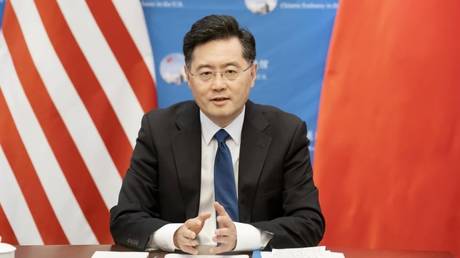
A trusted ally to Chinese President Xi Jinping will now serve as Beijing’s top diplomat
China’s former ambassador to the United States, Qin Gang, has been promoted to the foreign minister position, replacing longtime FM Wang Yi, who has taken up a role at the politburo of the ruling Communist Party.
The Foreign Ministry announced the decision on Friday, noting that the 56-year-old Qin will replace Wang immediately. Though the previous foreign minister was elected to the politburo in October, it took some time to confirm his successor.
In his first statement as foreign minister, Qin said Beijing’s diplomatic approach will be based on “Chinese wisdom, Chinese initiatives and Chinese strength.”
Having served as China’s envoy to the US since last year, Qin has gradually risen through the ranks of the Foreign Ministry, also holding the vice FM position between 2018 and 2021. He began his career in government at the Beijing Service Bureau for Diplomatic Missions after receiving a degree in international politics from University of International Relations in 1988, later becoming a diplomatic attaché dealing with Western European affairs.
Since taking the ambassadorship, Qin has published a number of op-eds in American media outlets reflecting China’s stance on a range of issues, often emphasizing friendly collaboration. In a column earlier this week seeking to elucidate “How China Sees the World,” he argued that “China-US relations should not be a zero-sum game” while calling to “explore a way to get along based on mutual respect, peaceful coexistence and win-win cooperation.”
Wang has also had a storied career, holding the FM role for the last decade after serving in a litany of diplomatic positions since the 1980s, including on issues related to Japan, Taiwan, Israel and Palestine, and Asian affairs more broadly. As one of his last moves as foreign minister, Wang held a call with his US counterpart, Secretary of State Antony Blinken, who he warned to stop Washington’s “old routine of unilateral bullying” and to cease attempts to suppress China’s development.
The contentious call highlighted growing tensions between Beijing and Washington as Qin takes on his new job, with US President Joe Biden continuing many of his predecessor’s more aggressive policies since assuming office last year. In addition to regular transits through the disputed Taiwan Strait by US warships, Biden has presided over a simmering trade war targeting Chinese companies, while American lawmakers continue direct diplomacy with Taiwan, which Beijing considers to be part of its sovereign territory.
READ MORE: US State Department’s new anti-China unit is a waste of time and resources




